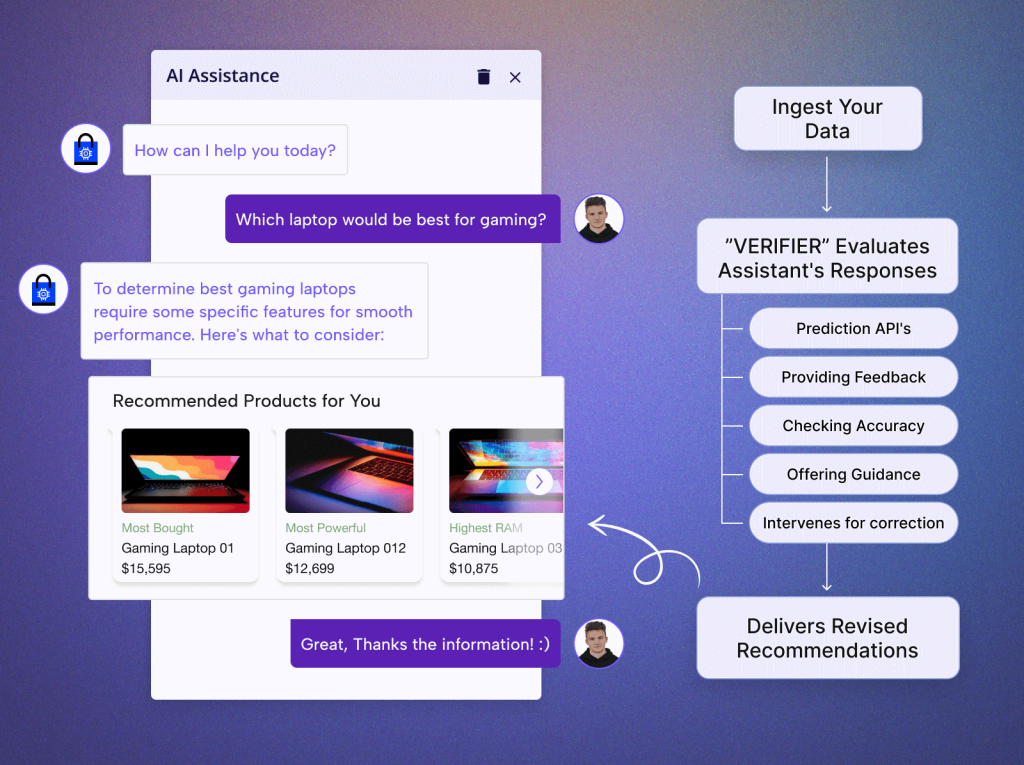Bagisto, the open-source e-commerce platform, and the power of AI Agents in Bagisto are brimming with growth potential. One exciting frontier lies in the integration of Artificial Intelligence (AI) agents.
These intelligent software programs can supercharge Bagisto stores, offering enhanced customer experiences, streamlined operations, and data-driven decision-making.
AI Agents in Bagisto
Let’s take an example of a normal shopping scenario
You’re looking for a new laptop and you ask Bagisto, “Which laptop would be best for gaming?”
Bagisto, being equipped with a general-purpose e-commerce LLM, can provide basic information about laptops available on the market. It can tell you about different brands, specifications, and prices.
However, to accurately recommend a laptop for gaming, Bagisto needs more specialized knowledge. It needs to consider factors like graphics card capabilities, processor speed, RAM, and cooling systems.
Bagisto reaches out to a specialized LLM trained in gaming hardware and performance. This specialized LLM provides Bagisto with detailed insights into the specifications required for gaming laptops. It explains that a laptop with a dedicated graphics card, high processor speed, ample RAM, and efficient cooling would be best suited for gaming.
Now, armed with this specialised knowledge, Bagisto can recommend specific laptops that meet these criteria, taking into account factors like customer reviews, price, and availability.

This amalgamation of general-purpose LLM and specialised LLM to provide comprehensive responses to user queries is AI agents.
Use Cases of AI Agents in Bagisto
- Product Recommendations: A Bagisto agent can analyze a customer’s browsing and purchasing behaviour to provide personalized product recommendations. Customers can be given recommendations based on past purchases, items in their shopping carts, and items they have viewed.
- Customer Support Chatbots: Bagisto can provide instant customer support using chatbots integrated with AI agents. Customers can use these chatbots to ask common questions, check the status of their orders, search for products, and even make payments.
- Inventory Management Optimization: AI agents can analyze historical sales data, current inventory levels, and market trends to optimize inventory management. To maximize profitability, they can predict demand for products, recommend stock replenishment levels, and even recommend pricing strategies.
- Dynamic Pricing: Bagisto can leverage AI agents to implement dynamic pricing strategies based on various factors such as demand, competitor pricing, and customer segmentation. As a result, these agents can adjust prices in real-time to optimize sales and revenue.
- Fraud Detection: AI agents can help detect fraudulent transactions by analyzing patterns and anomalies in customer behaviour, such as unusual purchase amounts, multiple failed payment attempts, or transactions from high-risk locations.
- Product Search and Discovery: Bagisto can employ AI agents to enhance product search and discovery capabilities. These agents can understand natural language queries, analyze product descriptions and attributes, and provide relevant search results to users.
- Customer Sentiment Analysis: AI agents can monitor customer reviews, social media mentions, and other sources of feedback to perform sentiment analysis. This helps Bagisto understand customer satisfaction levels, identify areas for improvement, and respond to customer concerns in real-time.
- Automated Order Processing: AI agents can streamline order processing by automatically categorizing orders, assigning them to appropriate fulfilment centres, and optimizing delivery routes for efficient shipping.
Autonomy of AI Agents
Let’s consider a similar scenario with Bagisto and its AI agents.
Imagine Bagisto has an AI agent called “Assistant” designed to provide customer support and assistance throughout the shopping process. However, the Assistant isn’t perfect; sometimes it may provide inaccurate product recommendations or struggle to understand complex queries.
To help the Assistant improve, Bagisto introduces another AI agent called “Verifier” whose role is to check the Assistant’s responses and provide feedback.
Here’s how it works: A customer asks the Assistant a question, such as “Which laptop is best for graphic design?” The assistant provides an answer based on its current knowledge and algorithms. Before the customer sees the response, Verifier quickly evaluates it. If the Assistant’s answer is accurate and helpful, the Verifier lets it stand. But if the Assistant’s answer is incorrect or unclear, the Verifier steps in and offers guidance or correction.
For example, if the Assistant recommends a laptop with insufficient RAM for graphic design, the Verifier intervenes, pointing out the importance of ample RAM for such tasks. The assistant then revises its recommendation accordingly.
This iterative process continues, with the Verifier guiding the Assistant to improve its responses over time. As the Assistant receives more feedback and corrects its mistakes, it becomes increasingly proficient at providing accurate and relevant assistance to customers autonomously.

Eventually, the Assistant achieves a high level of autonomy, capable of accurately responding to a wide range of customer queries and providing personalized recommendations without constant oversight from the Verifier.
This autonomy is made possible by the continuous guidance and feedback loop established by Verifier, ultimately enhancing the customer experience on Bagisto.



Be the first to comment.